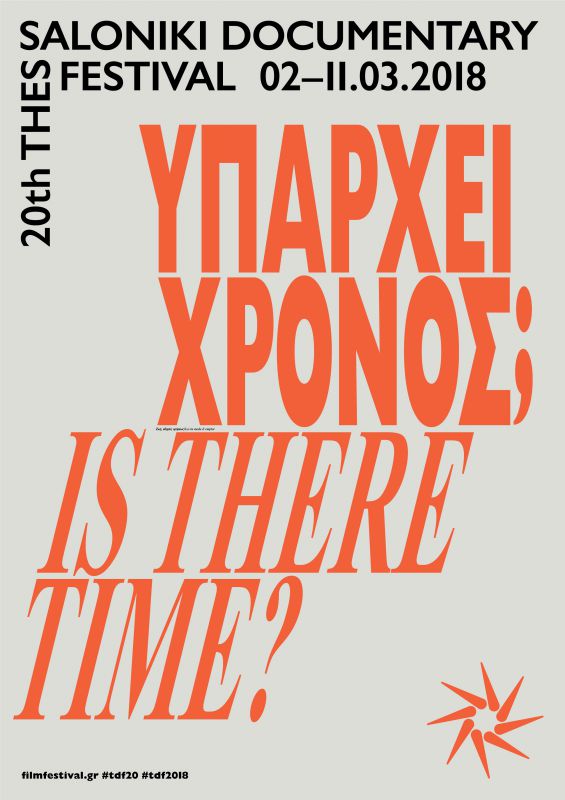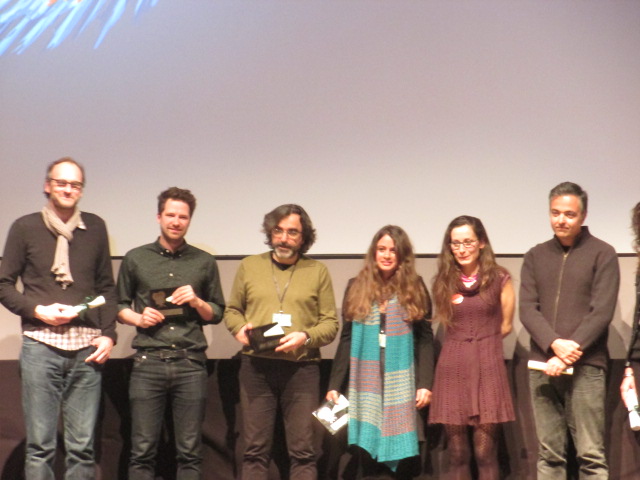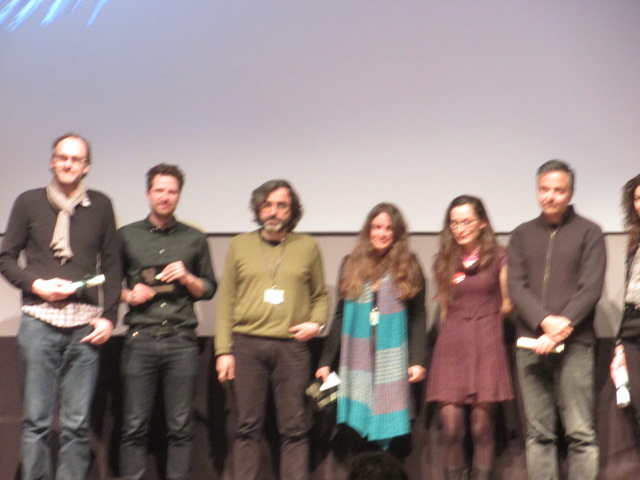|
|
||
|
Pro Tools
FILMFESTIVALS | 24/7 world wide coverageWelcome ! Enjoy the best of both worlds: Film & Festival News, exploring the best of the film festivals community. Launched in 1995, relentlessly connecting films to festivals, documenting and promoting festivals worldwide. Sorry for the interruption, we needed to correct and upgrade some modules. Working on a new website. For collaboration, editorial contributions, or publicity, please send us an email here. You need for put your full detail information if you want to be considered seriously. Thanks for understanding. User login |
Press Conference - Should I Stay or Should I Go? / Becoming an Actor / Affection to the People / Kismet @ 16th TDF
Affection to the People is a film about the censorship of Greek films by the junta regime that ruled Greece from 1967 to 1974. “I spent many years researching, because the material was uncategorized and scattered across the Greek Film Archive, the General Archives of Greece, the Ministry of Foreign Affairs and other places,” said director Vassilis Douvlis. Many Greek filmmakers, including Thodoros Angelopoulos in one of his last interviews, appear in the documentary. “The film shows the absurdity of intolerance and the tricks filmmakers resorted to as they tried to evade censorship. Angelopoulos said that the conditions of the era influenced his style, especially n the film Days of ’36, where he makes extensive use of indirect speech,” added the filmmaker. What often surprised Douvlis were the arguments the censors used in their reviews. For example a Luis Buñuel film was cut because the censor thought it had no artistic value, while a Jean-Luc Godard film was labelled as “the apogee of incoherence.” On the issue of censorship in the modern world, the director said: “Censorship is widespread across the world in authoritarian countries. In modern western societies, censorship has taken a different form. With the resurgence of racism and intolerance, groups of fanatics try to prevent the distribution and presentation of artworks that go against their own set of beliefs. The prevailing atmosphere is often so bleak, that artists resort to self-censorship.”
-16TH TDF PRESS RELEASE-
Edited by Vanessa McMahon 24.03.2014 | Thessaloniki's blog Cat. : Press Conference - Should I Stay or Should I Go? / Becoming an Actor / Affection to the People / Kismet @ 16th TDFCTION TO THE PEOPLE / KISMET News
|
LinksThe Bulletin Board > The Bulletin Board Blog Following News Interview with EFM (Berlin) Director
Interview with IFTA Chairman (AFM)
Interview with Cannes Marche du Film Director
Filmfestivals.com dailies live coverage from > Live from India
Useful links for the indies: > Big files transfer
+ SUBSCRIBE to the weekly Newsletter DealsUser imagesAbout Thessaloniki Mcmahon Vanessa Mcmahon Vanessa Vanessa McMahon Covered the 13th and 14th, and 16th edition. Through its tributes, it focuses both on discovering filmmakers with a unique cinematic point of view, and on the internationally recognized for their contribution to documentary. Contributions from Buno Chatelin http://tdf.filmfestival.gr/default.aspx?lang=en-US&loc=6&page=760 View my profile Send me a message My festivalThe EditorUser contributions |




















 Directors, Menelaos Karamaghiolis (Should I Stay or Should I Go?), Dimitris Koutsiabasakos (Becoming an Actor), Vassilis Douvlis (Affection to the People) and Nina Maria Paschalidou (Kismet) gave a press conference on Friday, 21 March 2014, in the context of the 16th Thessaloniki Documentary Festival.
Directors, Menelaos Karamaghiolis (Should I Stay or Should I Go?), Dimitris Koutsiabasakos (Becoming an Actor), Vassilis Douvlis (Affection to the People) and Nina Maria Paschalidou (Kismet) gave a press conference on Friday, 21 March 2014, in the context of the 16th Thessaloniki Documentary Festival. In Becoming an Actor, Dimitris Koutsiabasakos follows a group of young people who study to become actors. Koutsiabasakos teaches cinema acting and knows from his own personal experience how hard this profession is. “A crucial aspect in any documentary is to establish a relationship of trust with your protagonists. We started shooting only after we had earned that trust. In the script, we decided to use the questions all students ask. That allowed us to see how the young students changed with time, giving different answers to the perennial question of how you become an actor. Studying to be an actor is a process of getting to know your own body and self,” said Koutsiabasakos. The interesting thing is that although young people know that unemployment rates in the profession are close to 90%, they still make a conscious choice to become actors. Perhaps the best way to deal with the current crisis in Greece is by going after our dreams.”
In Becoming an Actor, Dimitris Koutsiabasakos follows a group of young people who study to become actors. Koutsiabasakos teaches cinema acting and knows from his own personal experience how hard this profession is. “A crucial aspect in any documentary is to establish a relationship of trust with your protagonists. We started shooting only after we had earned that trust. In the script, we decided to use the questions all students ask. That allowed us to see how the young students changed with time, giving different answers to the perennial question of how you become an actor. Studying to be an actor is a process of getting to know your own body and self,” said Koutsiabasakos. The interesting thing is that although young people know that unemployment rates in the profession are close to 90%, they still make a conscious choice to become actors. Perhaps the best way to deal with the current crisis in Greece is by going after our dreams.” Should I Stay or Should I Go? is named after a documentary theatre performance that inspired director Menelaos Karamaghiolis. “In the film, we see everyday people in Athens and Berlin, taking pieces of their lives and turning them into theatre; we see how the doc format can be adapted to the theatre. In documentary theatre, the play is written during the rehearsals,” noted the director. What surprised the filmmaker was that tickets were sold out both in Athens and Berlin, a sign that the play struck a chord with the audience. The documentary is not only about the art of theatre, however; it is also about immigration. This issue is raised by interviews with immigrants from different generations: from the 70-year-old Gastarbeiter or the woman who left Greece during the junta, to the young Greeks leaving the country because of the recent crisis. “Essentially, this is not a film about art, but about the crisis. Today’s immigrants handle things differently, they are not ashamed to say ‘I have no work’. They try to find a solution, and the play is such a temporary solution. Money is not an end in itself for young immigrants; they may work as cleaners or manual workers, but they keep pursuing their dreams.”
Should I Stay or Should I Go? is named after a documentary theatre performance that inspired director Menelaos Karamaghiolis. “In the film, we see everyday people in Athens and Berlin, taking pieces of their lives and turning them into theatre; we see how the doc format can be adapted to the theatre. In documentary theatre, the play is written during the rehearsals,” noted the director. What surprised the filmmaker was that tickets were sold out both in Athens and Berlin, a sign that the play struck a chord with the audience. The documentary is not only about the art of theatre, however; it is also about immigration. This issue is raised by interviews with immigrants from different generations: from the 70-year-old Gastarbeiter or the woman who left Greece during the junta, to the young Greeks leaving the country because of the recent crisis. “Essentially, this is not a film about art, but about the crisis. Today’s immigrants handle things differently, they are not ashamed to say ‘I have no work’. They try to find a solution, and the play is such a temporary solution. Money is not an end in itself for young immigrants; they may work as cleaners or manual workers, but they keep pursuing their dreams.” In Kismet Nina Maria Paschalidou presents the influence of Turkish soap operas on the emancipation of women in the Arab and Balkan countries. “Women in Arabic countries find inspiration in the heroines of the Turkish TV series and fight for their rights. For example a woman in Abu Dhabi, who had been abused by her husband and remained, locked inside her house for 12 years with only Fatmagul to keep her company, decided to file for divorce and break free from her domestic prison. Another telling example is Samira, the well-known Egyptian activist, who was sexually harassed by soldiers and then sued the Egyptian army. She eventually succeeded in banning the virginity tests in Cairo,” the director said. She went on to explain that she was impressed with how much, Egyptian women in particular, think of the Turkish series female protagonists as their role models.
In Kismet Nina Maria Paschalidou presents the influence of Turkish soap operas on the emancipation of women in the Arab and Balkan countries. “Women in Arabic countries find inspiration in the heroines of the Turkish TV series and fight for their rights. For example a woman in Abu Dhabi, who had been abused by her husband and remained, locked inside her house for 12 years with only Fatmagul to keep her company, decided to file for divorce and break free from her domestic prison. Another telling example is Samira, the well-known Egyptian activist, who was sexually harassed by soldiers and then sued the Egyptian army. She eventually succeeded in banning the virginity tests in Cairo,” the director said. She went on to explain that she was impressed with how much, Egyptian women in particular, think of the Turkish series female protagonists as their role models.








